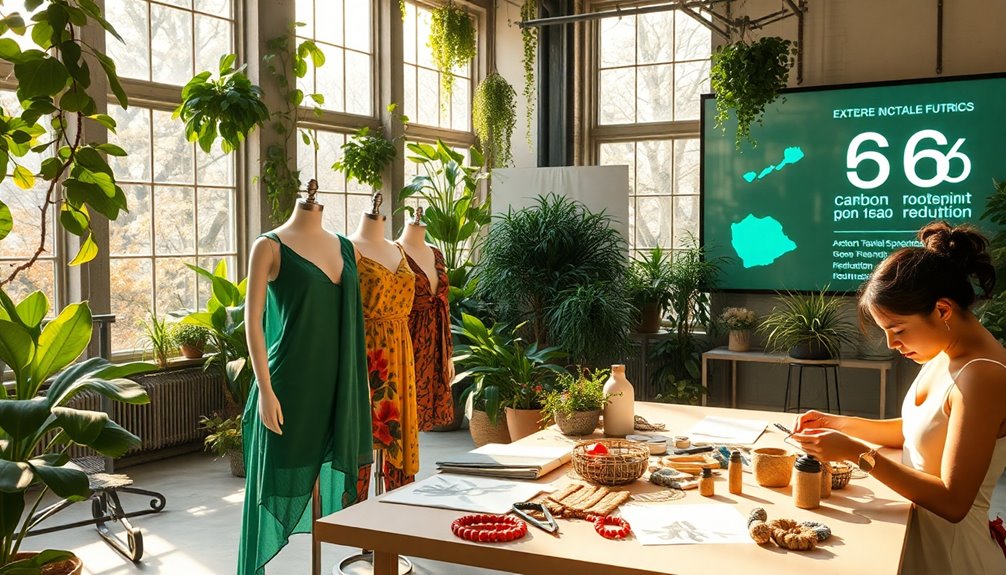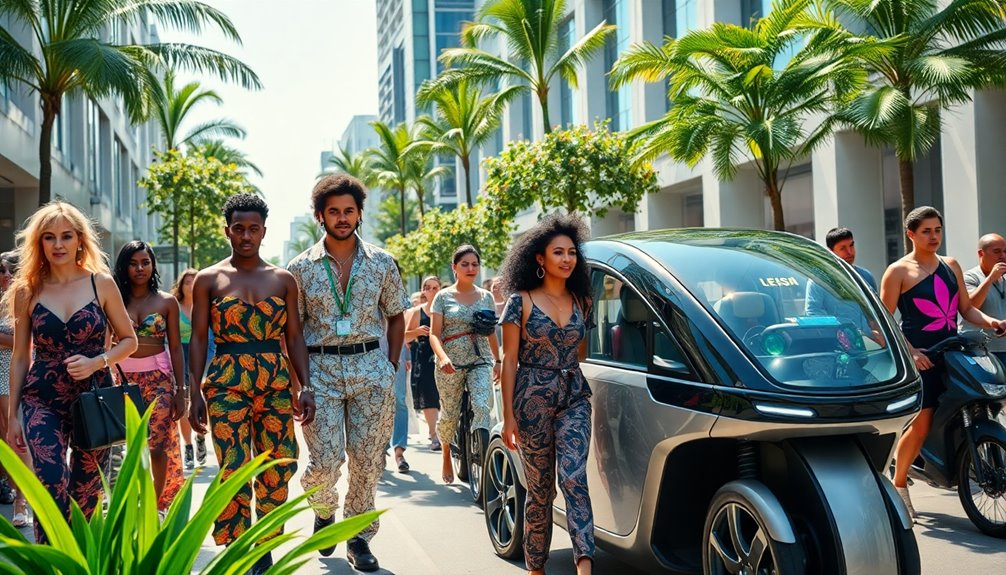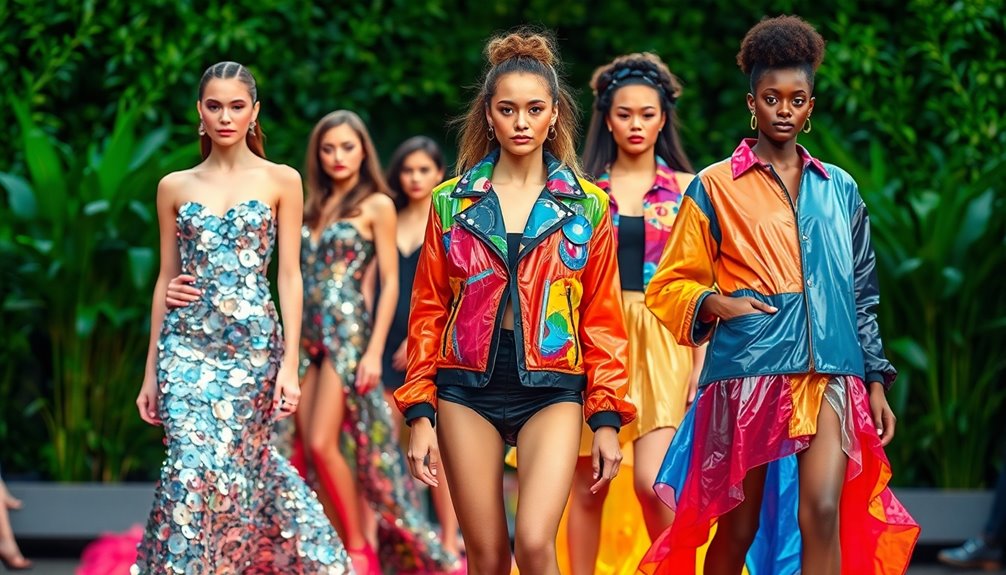In 2025, top fashion brands are rethinking sustainability by embracing eco-friendly practices that meet your expectations. They're shifting toward circular fashion with resale and repair options to minimize waste. Technology plays a big role too, enhancing transparency in sourcing and production, so you can trust the brands you support. Many are turning to biodegradable materials, reducing reliance on synthetics. On-demand production also helps tackle excess inventory, promoting responsible consumption. With these innovative strategies, brands are aligning with your values and ethics, making sustainability a priority. Want to see how these changes unfold?
Key Takeaways
- Top fashion brands are prioritizing sustainability by integrating eco-friendly practices into their core values and operations.
- Circular fashion initiatives are being adopted, promoting resale, repair services, and take-back programs to reduce textile waste.
- Technology like blockchain and AI is enhancing traceability and accountability in supply chains, ensuring ethical sourcing and fair labor practices.
- Brands are shifting towards biodegradable materials, reducing reliance on synthetic fibers to meet consumer demand for sustainable options.
- Collaboration with ethical suppliers and continuous education on sustainability are becoming essential for brands aiming for long-term success in the industry.
Current Landscape of Fashion Sustainability

As the fashion industry grapples with rising consumer demand for sustainable products, it's surprising that only 32% of brands have made sustainability a top priority in 2025.
Despite 70% of consumers wanting eco-friendly options, major brands report a 15% drop in sustainability investments, primarily due to economic pressures.
Apparel's carbon footprint is alarming, contributing about 4% of global emissions, projected to exceed 25% by 2050 without action.
You'll notice that consumer loyalty hinges on accountability and transparency; 60% value brands that prioritize sustainability.
The secondhand market is booming, growing 15 times faster than the overall sector, indicating a shift toward a circular economy.
Brands need to adapt or risk losing relevance in this evolving landscape.
Circular Fashion Initiatives

While the fashion industry faces increasing pressure to adopt sustainable practices, circular fashion initiatives are emerging as an essential solution. These initiatives focus on shifting from a buy-wear-dispose model to one that prioritizes sustainability.
By promoting resale platforms, repair services, and take-back programs, brands can considerably reduce textile waste. Currently, only 12% of clothing is recycled globally, contributing to a staggering 92 million tons of textile waste each year.
By 2025, brands are committed to doubling their use of recycled materials and developing lifecycle plans for their products. For example, Reformation aims to reduce synthetic materials to less than 1% of total sourcing.
Such efforts, supported by legislation like California's SB707, underscore the importance of circularity in the fashion industry.
Technology's Role in Transparency

Circular fashion initiatives are setting the stage for a new era in the industry, but to fully realize their potential, brands must embrace technology for enhanced transparency.
By leveraging blockchain and AI, you can guarantee traceability in clothing sourcing and production, addressing consumers' growing demand for transparency. Tech-driven traceability solutions are essential for building trust and accountability within supply chains.
With only 12% of clothing recycled globally, integrating technology into supply chain management is significant for improving recycling rates and cutting down on the staggering 92 million tons of textile waste produced annually.
Additionally, Product Lifecycle Management (PLM) systems empower informed decision-making, helping your brand tackle ethical sourcing and labor practices effectively for a more sustainable business.
On-Demand Production Trends

On-demand production is reshaping the fashion landscape by reducing waste and overproduction, which means less unsold inventory cluttering landfills.
You'll see brands focusing on customization, allowing you to get designs tailored just for you while promoting sustainability.
As technology advances, expect more innovative options that further enhance this eco-friendly approach.
Benefits of On-Demand Production
As consumers increasingly seek unique and personalized clothing, the benefits of on-demand production have become more evident. This model considerably reduces overproduction and waste, tackling the alarming fact that 30% of globally produced clothing goes unsold each year.
By prioritizing custom-fit designs, on-demand production emphasizes quality over mass production, aligning with your desire for sustainability. With brands facing financial losses due to excess inventory, many are shifting toward demand-based practices.
On-demand fashion not only minimizes environmental impact but also embraces the principles of circular fashion, promoting a more responsible approach to consumption. As you choose on-demand options, you're not just getting unique pieces; you're contributing to a more sustainable future in the fashion industry.
Reducing Waste and Overproduction
While the fashion industry grapples with the consequences of overproduction, innovative on-demand production trends emerge as a solution to substantially reduce waste.
By aligning production with actual consumer demand, brands can create a more sustainable future.
Here's how on-demand fashion is changing the game:
- Custom-fit designs: You get unique, personalized apparel that speaks to your style.
- Minimized environmental impact: Waste decreases as brands avoid excess inventory, protecting our planet.
- Financial savings: Brands mitigate losses from unsold stock, creating a healthier economic model.
Moreover, adopting on-demand production aligns with circular economy practices that emphasize reuse and recycling, further enhancing sustainability in fashion.
Embracing on-demand production not only curbs waste but also positions brands as responsible leaders in the sustainable fashion movement.
It's a win-win for you, the consumer, and the environment.
Innovations in Customization Technology
With advancements in customization technology, the fashion industry is transforming how you experience shopping.
On-demand manufacturing is becoming a key strategy to combat the staggering 30% of clothing that goes unsold each year. This model prioritizes custom-fit designs, ensuring high-quality pieces tailored just for you.
By embracing on-demand production, brands not only cater to your desire for personalization but also greatly reduce carbon emissions associated with mass manufacturing.
This thoughtful approach makes the industry more sustainable and circular, allowing brands to respond swiftly to changing trends while minimizing waste.
As we move towards 2025, expect this shift to reshape the fashion landscape, making it more eco-friendly and aligned with your values.
Biodegradable Materials Revolution

The growing focus on biodegradable materials marks a pivotal shift in the fashion industry, as brands recognize the need for sustainable alternatives to synthetic fibers.
By 2025, you'll see fashion brands prioritizing fabrics that decompose naturally, greatly reducing their ecological footprint.
Consider these inspiring options:
- Mycelium leather – a trendy, compostable alternative to traditional leather.
- Hemp fabric – durable, breathable, and fully biodegradable.
- Organic cotton – cultivated without harmful chemicals, returning to the earth gracefully.
As approximately 60% of clothing currently consists of synthetic fibers, this change is essential.
Embracing biodegradable materials not only enhances market appeal but also aligns with your desire for sustainability and eco-conscious fashion choices.
Personalizing Sustainable Practices

As consumers, you're increasingly looking for fashion that reflects your individual needs while also prioritizing ethical sourcing.
Brands are responding by offering customizable options that align with your values, ensuring that every purchase is a step toward sustainability.
This shift not only enhances your personal style but also supports fair practices in the industry.
Customization and Individual Needs
While many consumers seek unique clothing that reflects their personal style, fashion brands are responding by embracing customization and sustainable practices.
By adopting on-demand manufacturing, these brands address individual needs while greatly reducing overproduction.
Consider these trends shaping your shopping choices:
- Custom-fit designs that prioritize your unique body shape.
- Pre-owned clothing options that cater to your desire for both sustainability and style.
- AI-driven recommendations that align with your preferences, minimizing waste.
With 70% of you prioritizing sustainability in brand loyalty, brands are adjusting their offerings.
They're focusing on biodegradable materials and sustainable fabrics to meet consumer preferences while promoting a more personalized shopping experience. Additionally, the importance of balanced nutrition is becoming a key consideration for brands as they explore eco-friendly materials that promote health and sustainability.
Ethical Sourcing Awareness
Customization and individual needs in fashion aren't just about unique designs; they extend to how brands source their materials and labor.
Ethical sourcing is becoming essential as 70% of you now consider sustainability when shopping. Brands can no longer ignore the reality of modern slavery, which generates over $150 billion annually.
You demand accountability and transparency in supply chains, especially since many victims work in the garment industry. Yet, only 32% of brands prioritize sustainability as a key initiative, exposing a significant gap.
To bridge this divide, brands must adopt traceability technologies like blockchain, ensuring ethical labor practices and fair wages.
After all, sustainability is no longer a buzzword; it's a critical expectation for conscious consumers like you.
Frequently Asked Questions
How Can Consumers Identify Truly Sustainable Fashion Brands?
To identify truly sustainable fashion brands, start by researching their materials and production processes.
Look for certifications like GOTS or Fair Trade, which signal ethical practices.
Check if they disclose their supply chain and labor conditions.
Engage with brands on social media; ask questions about their sustainability initiatives.
Read reviews and articles about their impact.
Finally, support companies that prioritize transparency and genuinely commit to reducing their environmental footprint.
What Certifications Should Sustainable Fashion Brands Have?
When you think of a world where nature thrives, it's essential to look for certifications that guarantee fashion brands are truly sustainable.
Check for GOTS, which certifies organic textiles, or Fair Trade, confirming ethical labor practices.
The Global Recycled Standard (GRS) verifies recycled materials are used, while the OEKO-TEX label assures you of chemical safety.
How Do Sustainable Practices Affect Clothing Prices?
Sustainable practices can raise clothing prices due to the higher costs of eco-friendly materials and ethical labor.
When brands prioritize sustainability, they often invest in better production processes and certifications, which adds to their expenses.
You might notice that while the initial price tag is steeper, these garments tend to last longer and reduce environmental impact.
Ultimately, you're paying for quality and responsibility, which can be worth it in the long run.
Are There Fashion Brands That Focus on Fair Labor Practices?
Like a lighthouse guiding ships through a storm, several fashion brands shine a light on fair labor practices.
Yes, you'll find brands such as Patagonia, Everlane, and Reformation that prioritize ethical sourcing and worker welfare.
They're committed to transparency in their supply chains, ensuring that their workers are treated fairly and paid adequately.
What Role Do Consumers Play in Promoting Sustainability?
You play an essential role in promoting sustainability by choosing to support brands that prioritize eco-friendly practices.
When you make conscious purchasing decisions, you send a message that sustainable products matter. Your voice matters too; by sharing your preferences on social media or through reviews, you influence companies to adopt greener practices.
Additionally, you can advocate for transparency, demanding information about a brand's environmental and labor policies.
Your actions can drive positive change in the fashion industry.
Conclusion
As you navigate the ever-evolving landscape of fashion sustainability, think of yourself as a sculptor shaping a masterpiece. By embracing circular initiatives, leveraging technology for transparency, and opting for on-demand production, you're not just following trends—you're forging a path toward a more conscious future. The revolution in biodegradable materials and personalized practices empowers you to make choices that resonate with your values. Together, let's carve out a sustainable fashion world that reflects our commitment to the planet.










